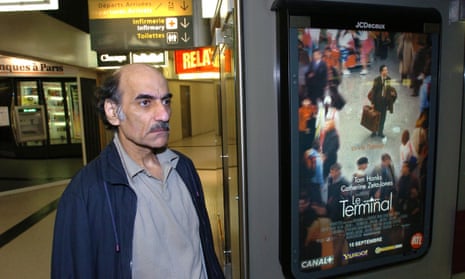An Iranian man who lived for 18 years in Paris’s Charles de Gaulle airport and inspired the 2004 Steven Spielberg film The Terminal died on Saturday in the airport, officials said.
Mehran Karimi Nasseri died after a heart attack in the airport’s Terminal 2F around midday, according to an official with the Paris airport authority. Police and a medical team treated him but were not able to save him, the official said.
Karimi Nasseri, who claimed to be British but is believed to have been born in 1945 in the Iranian province of Khuzestan, lived in the airport’s Terminal 1 from 1988 until 2006, first in legal limbo because he lacked residency papers and later by choice.
After spending some time at a hospital for an operation, then a hotel near the airport paid for with the money he’d received for film rights, and then a shelter for homeless people, he had returned to living at the airport again in recent weeks, the airport official said.
His saga inspired a 1993 French film and an opera by the composer Jonathan Dove, as well as Spielberg’s The Terminal, starring Tom Hanks and Catherine Zeta-Jones. Though the director’s production company reportedly paid Nasseri a fee for the rights to his story, he is not named in the film or any of the official publicity material. An autobiography, ghostwritten by the British author Andrew Donkin, was published in 2004.
According to the official account of his life that he himself would later dispute, Nasseri was born in Iran’s oil-rich south as one of six children, to a doctor father who worked for the Anglo-Iranian Oil Company.
Aged 23, shortly after his father died of cancer, his mother informed him that she was not his real mother and he was the result of an affair between his father and a Scottish nurse.
Shipped off to Britain, he spent three years studying Yugoslav Studies at the University of Bradford and participated in a protest against the Shah, which was given as a reason for him being stripped of his passport when he returned to Tehran.
Granted refugee status by Belgium in 1981, he tried to travel on to Britain to find his real mother, whom he believed to reside in Glasgow. He discarded his identification papers onboard an England-bound ship in the belief he would no longer require them, and fell into a stateless limbo.
Repeatedly detained upon arrival in the UK and sent back to Belgium or France, he eventually gave up and settled at Charles de Gaulle Airport in August 1988. In 1992, a French court ruled that Nasseri had entered the airport legally as a refugee and could not be expelled from it.
after newsletter promotion
After his story acquired fame over the years, Nasseri was offered citizenship first by Belgium and then France, but he rejected the paperwork as not being addressed to him, having by now renounced his Iranian heritage and claiming that he was a British citizen born in Sweden. He refused to sign his name other than as Sir Alfred Mehran, a name that appeared on one his letters of correspondence with British authorities.
At Charles de Gaulle, he reportedly spent most of his time on a red bench on the lower floor of terminal 1, declining donations and gifts apart from the occasional meal voucher from airport staff.
Asked by a journalist in 2003 whether he felt angry about having lost 15 years of his life at an airport terminal, he replied: “No angry. I just want to know who my parents are.”
